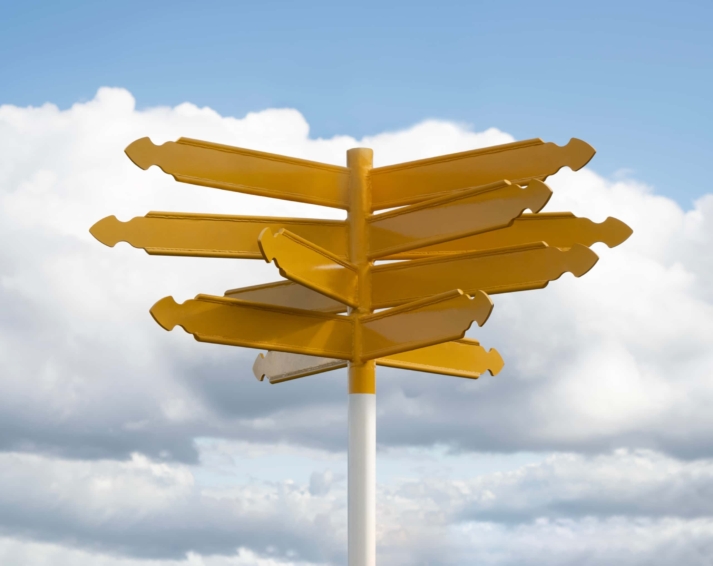Modern life confronts us with many choice points and, at each, many options. Some choices are trivial, such as which toilet paper to buy, and others are life-altering, such as whether I should marry this person I’ve been dating. Some individuals are better at making decisions, that is, they make them more easily, taking less effort and making them more quickly and at a lower emotional cost. Whether the ease with which one decides affects the quality of that decision is hard to tell. After all, the full consequences of some decisions may not become evident until one’s whole life has run through. And even then, the wisdom or foolishness of the decisions made remains up for debate.
One aim today is to acknowledge that consequential decisions are often hard to make and, for some persons, so hard to make that they avoid affirmatively making those decisions completely. Rather, they continue their current trajectory, letting the opportunities to choose different paths slip by. A second aim is to help those with decision-making difficulties begin to understand the nature of their challenges and overcome them.
The word decision itself contains a clue as to why making a choice is hard. The root of decision is –cision, etymologically derived from the Latin verb caedere, meaning to cut. The prefix de– means down or off. Thus, decision means to cut off. So, the humans that brought this word into existence focused on what is cut off from further possibility rather than what is chosen to bring into actuality. I think they understood the nature of the challenge.
With this background, let me break down the sources of emotional difficulty inherent in choosing. They are Certainty of Uncertainty, Fear of Regret, and Certainty of Loss.
Certainty of Uncertainty
First, what often makes decisions hard is the uncertainty of the outcome. The most uncertain of outcomes are the ones that fall far outside of anything one has ever experienced before. One cannot imagine something substantially different from what came before. One CAN learn vicariously, of course, and this helps make the unknown more familiar, to some degree. If a person without children imagines what it would be like to have children, they can look at the lives of their siblings or cousins or friends with children. But even in these close-to-home versions, observing from the outside provides an incomplete understanding at best or a misleading one at worst. For example, it is easier to observe that your brother with children cannot go out and party with friends anytime he wants, but it may be harder to imagine his experience of fatherhood and love for his children.
So, despite our incredible capacity for imagining possibilities and learning from others’ experiences, uncertainty remains unavoidable. I find that when I confront this fact head-on, it makes deciding on a course of action easier because I have converted an inchoate sense of unease into a clear view of confronting the unknown. This can lead me to beneficial actions, such as conducting more due diligence on my options and their possible consequences. This approach has the goal of decreasing (but not eliminating) the depth and breadth of the uncertainty I face. Additionally, in some circumstances, it is possible to ease into a new choice, trying it out (or on) tentatively.
Fear of Regret
Uncertainty is often closely followed by fear of regret. Regret is an emotion that arises when considering one’s past and feeling sadness or anger over past choices and thinking, often obsessively, of what might have been but was not. But in addition to a focus on the past, regret also plays a crucial role when considering the future: imagining various options that can dramatically alter the course of one’s life easily leads to a sense of regret of what might have come to be in the future, but what will never come to be because of a different life choice made in the present.
Certainty of Loss
And this fear of (future) regret leads to awareness of the unavoidability of certain losses. Whatever you choose, you will reject something else. The only time no cutting off of options occurs is when no options are present or not perceived to be so. Loss leads to, yes, regret, and to grief. Modern life because it provides so many choices and manifestations of options we might never have imagined if they were presented to us through media increases the difficulty, both practical and emotional, of making a decision. It makes FOMO – fear of missing out – endemic. Its emotional toll can lead to frank depression, anxiety, and even pathological indecisiveness.
As when facing the unavoidable uncertainty head-on, here again, I feel better facing the unavoidable loss head-on. I can then give myself the chance to grieve what might have come to pass but won’t. But there is more that one can do to face difficult and uncertain decisions.
Focusing on the Creative Aspect of One’s Confrontation with the Future
One antidote to a fear of decision-making is to focus on one’s agency. We humans are not passive recipients of “come what may” or, perhaps more accurately, not only passive recipients of oncoming events. We have the agency to act and to react. Trusting one’s agency to respond with active engagement and creativity to the oncoming events, the very events one chose to bring into actuality, provides a sense of control – partial though it will be. This control affords opportunities to continue to make further choices, to change things in the world to better reflect one’s needs and desires, and to approach each oncoming day with a sense of anticipation and adventure. So, facing the unknown is not only anxiety-provoking but also inspiring and motivating. It is only through such active and creative engagement that we come into being who we are meant to be. It is in challenge and struggle that our character, goals, values, and vision are honed. It is living in the world actively that allows us to transcend who we are today.
Thanks and take care.
Dr. Jack
Language Brief
“I am a part of all that I have met.” ― Alfred Tennyson
“We are what we pretend to be, so we must be careful about what we pretend to be.” ― Kurt Vonnegut
“The worst enemy to creativity is self-doubt.” ― Sylvia Plath
“There is a vitality, a life force, an energy, a quickening that is translated through you into action, and because there is only one of you in all time, this expression is unique. And if you block it, it will never exist through any other medium and will be lost.” ― Martha Graham







Leave A Comment